2023届高考英语一轮复习讲义素材:D篇阅读精析Day4-5
文档属性
| 名称 | 2023届高考英语一轮复习讲义素材:D篇阅读精析Day4-5 | 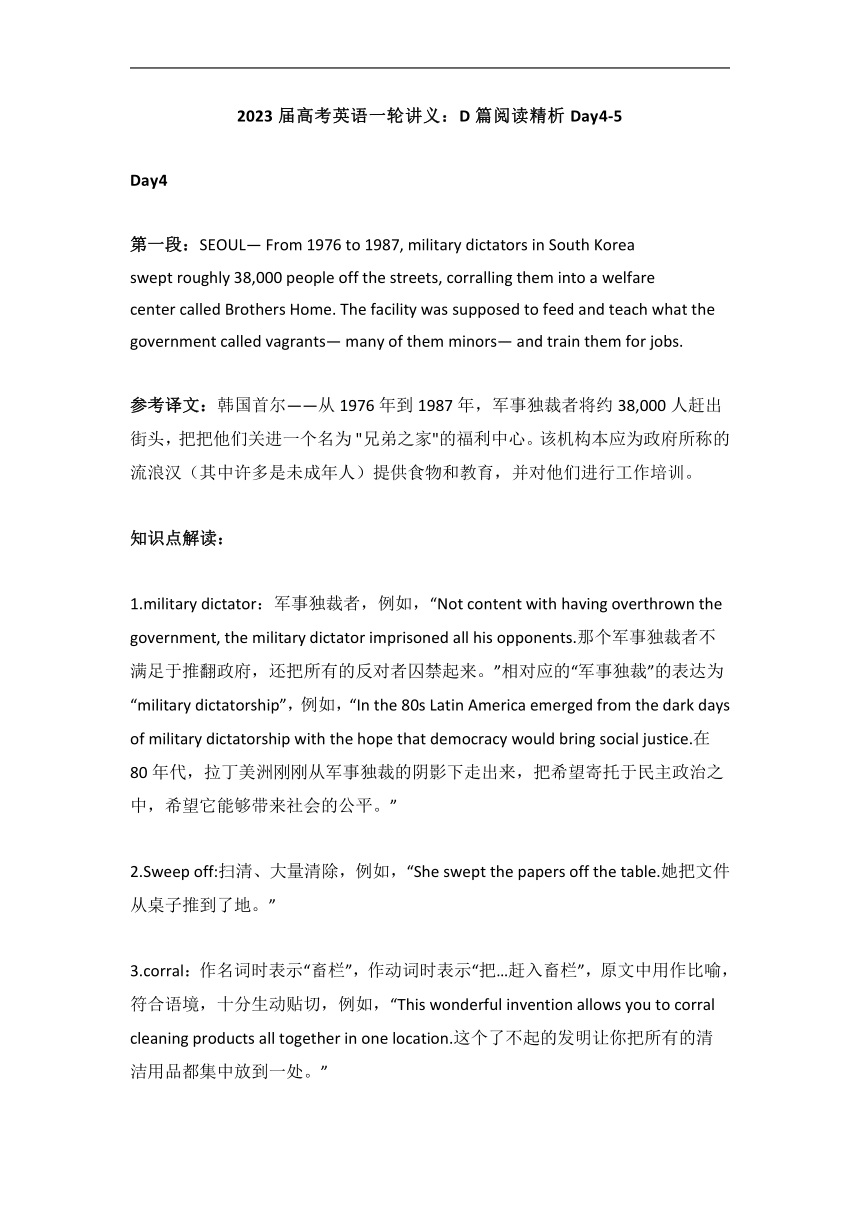 | |
| 格式 | docx | ||
| 文件大小 | 31.0KB | ||
| 资源类型 | 教案 | ||
| 版本资源 | 人教版(2019) | ||
| 科目 | 英语 | ||
| 更新时间 | 2022-10-17 07:34:59 | ||
图片预览

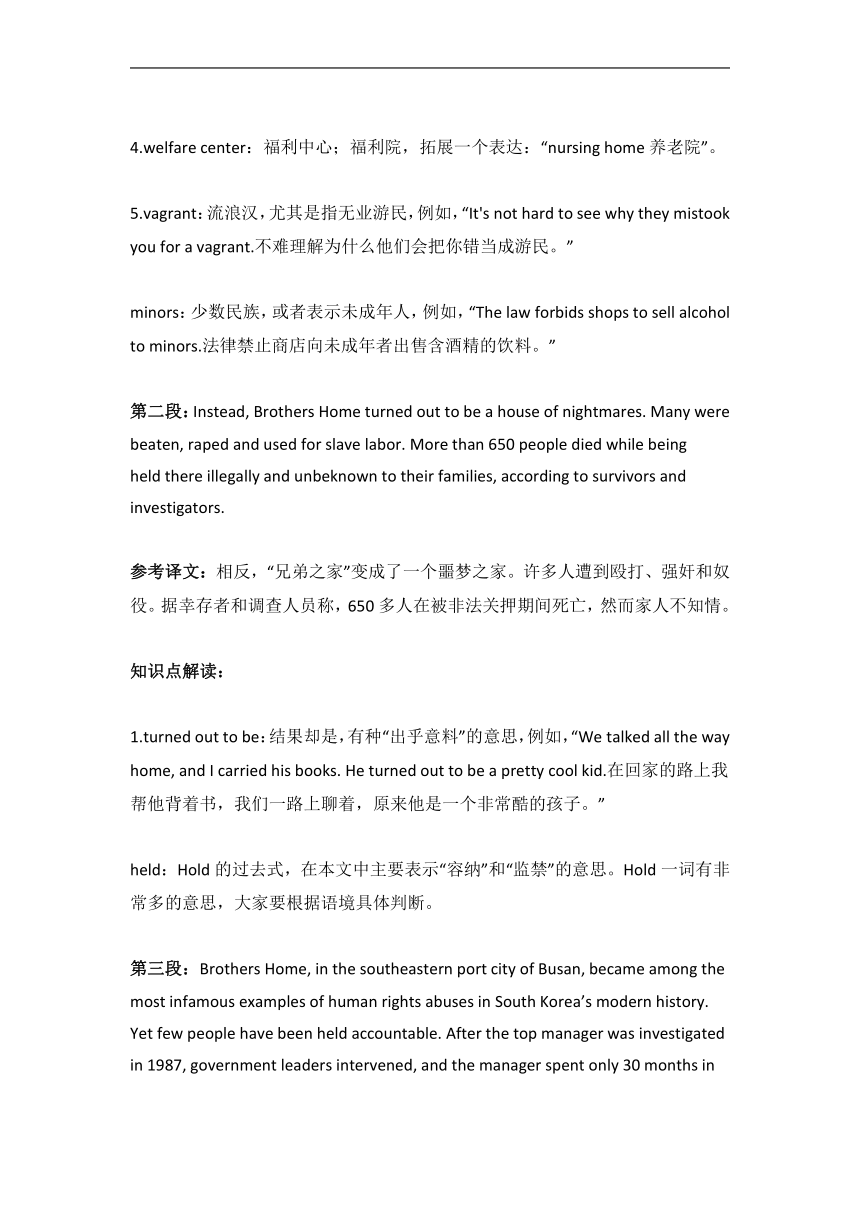
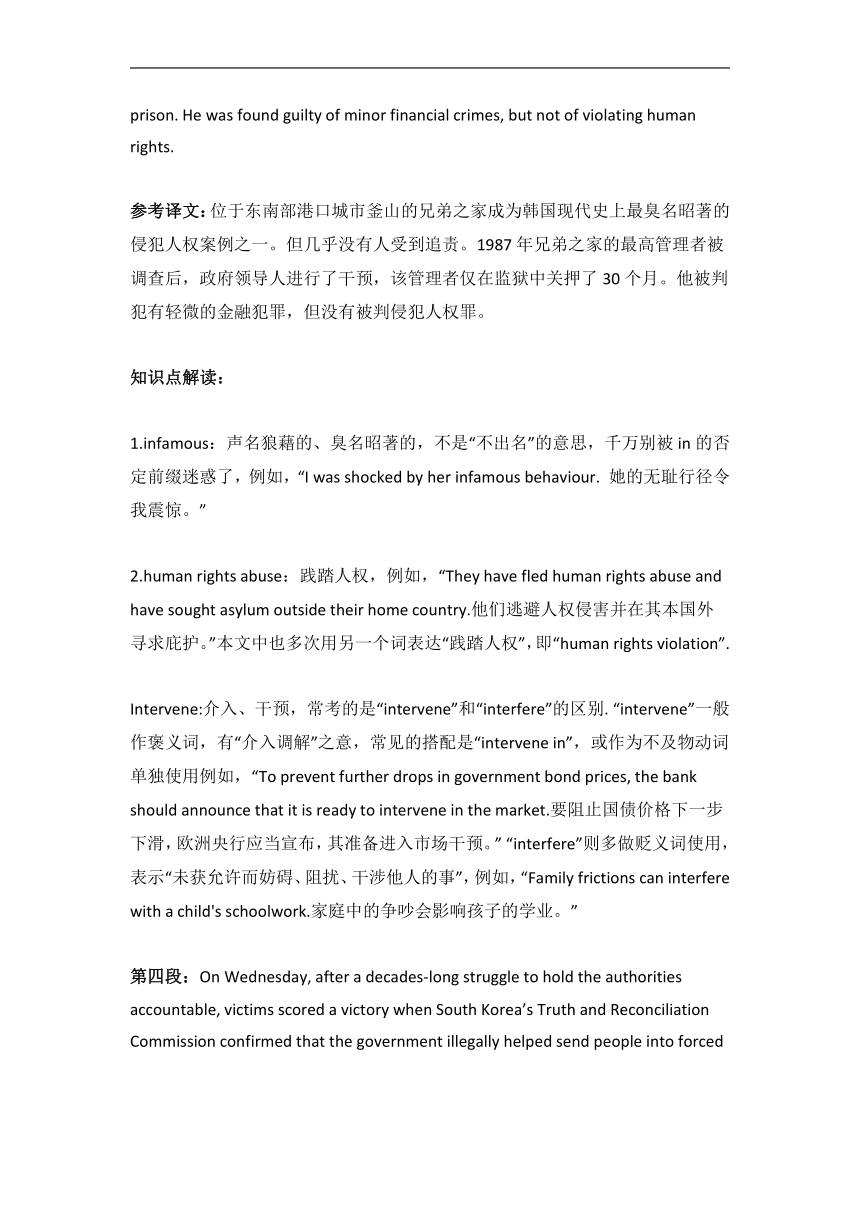
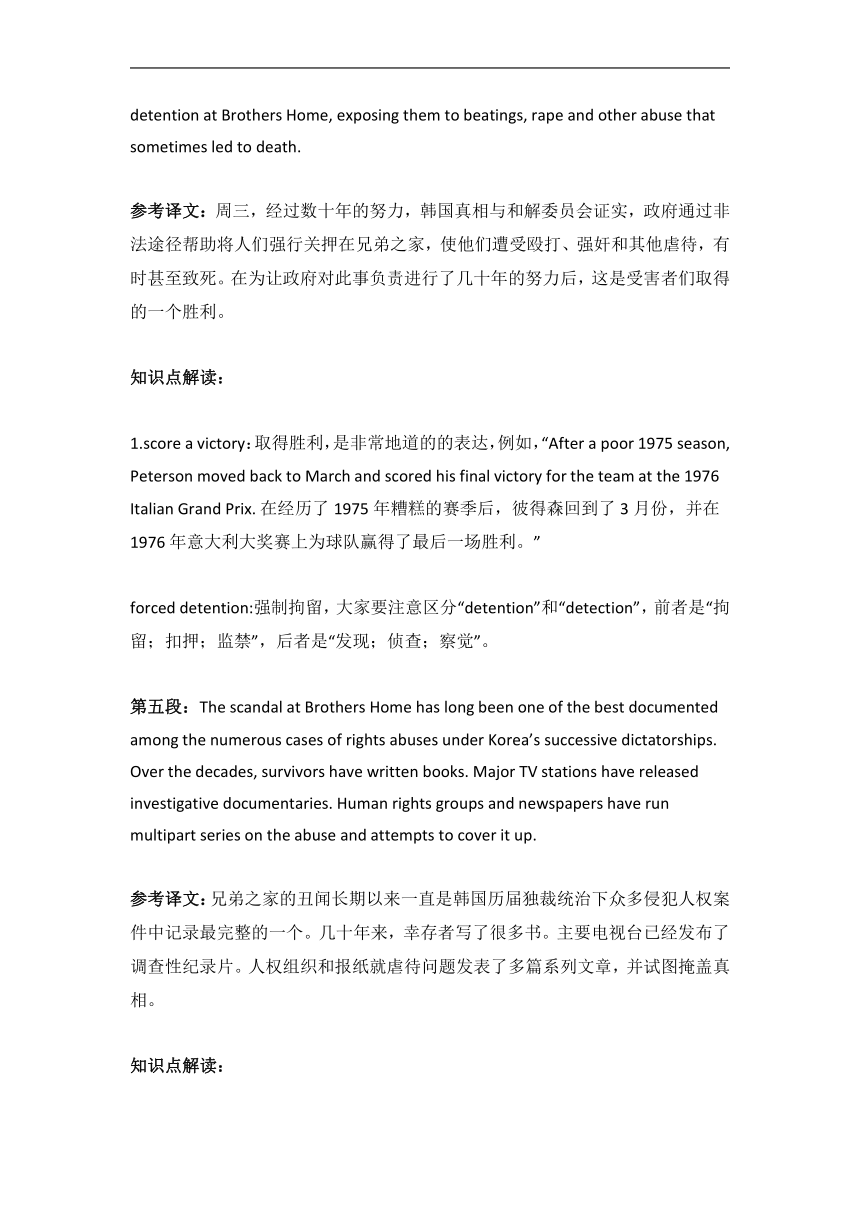
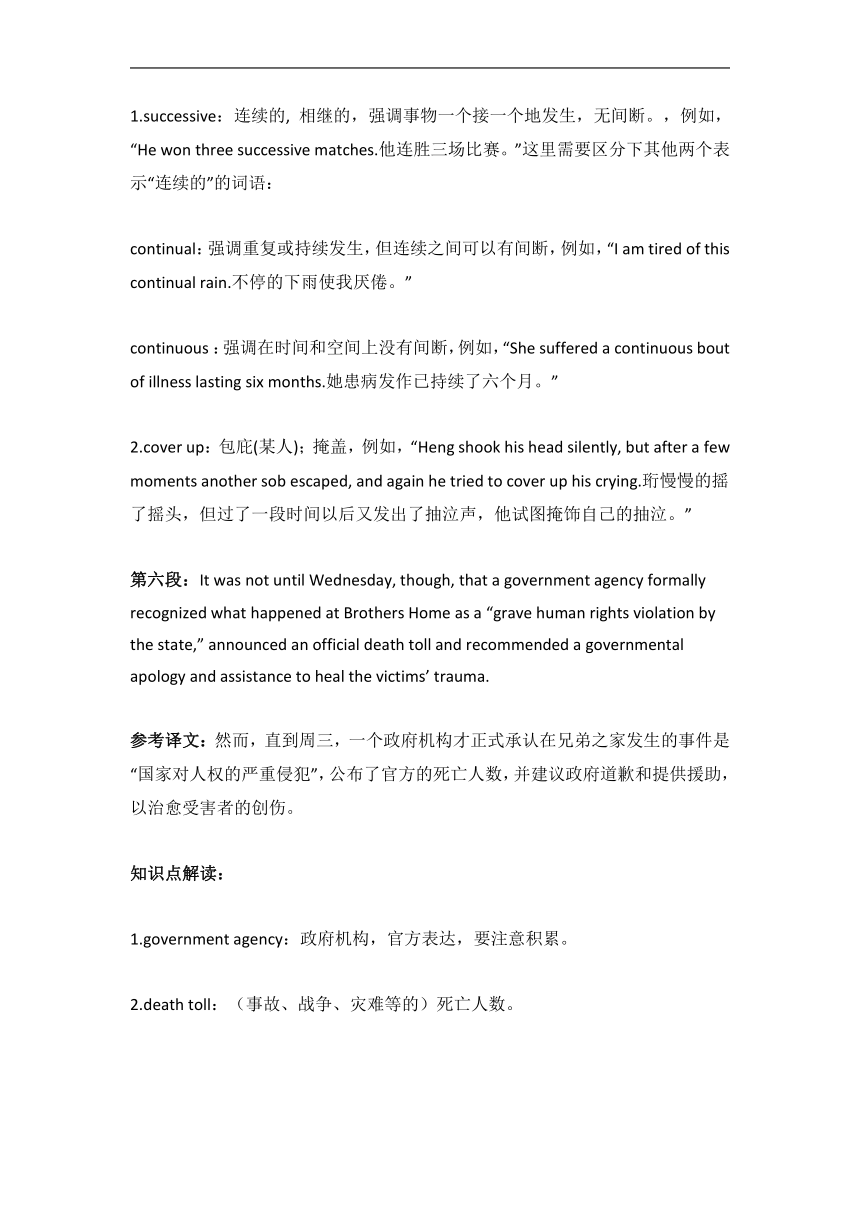
文档简介
2023届高考英语一轮讲义:D篇阅读精析Day4-5
Day4
第一段:SEOUL— From 1976 to 1987, military dictators in South Korea swept roughly 38,000 people off the streets, corralling them into a welfare center called Brothers Home. The facility was supposed to feed and teach what the government called vagrants— many of them minors— and train them for jobs.
参考译文:韩国首尔——从1976年到1987年,军事独裁者将约38,000人赶出街头,把把他们关进一个名为 "兄弟之家"的福利中心。该机构本应为政府所称的流浪汉(其中许多是未成年人)提供食物和教育,并对他们进行工作培训。
知识点解读:
1.military dictator:军事独裁者,例如,“Not content with having overthrown the government, the military dictator imprisoned all his opponents.那个军事独裁者不满足于推翻政府,还把所有的反对者囚禁起来。”相对应的“军事独裁”的表达为“military dictatorship”,例如,“In the 80s Latin America emerged from the dark days of military dictatorship with the hope that democracy would bring social justice.在80年代,拉丁美洲刚刚从军事独裁的阴影下走出来,把希望寄托于民主政治之中,希望它能够带来社会的公平。”
2.Sweep off:扫清、大量清除,例如,“She swept the papers off the table.她把文件从桌子推到了地。”
3.corral:作名词时表示“畜栏”,作动词时表示“把…赶入畜栏”,原文中用作比喻,符合语境,十分生动贴切,例如,“This wonderful invention allows you to corral cleaning products all together in one location.这个了不起的发明让你把所有的清洁用品都集中放到一处。”
4.welfare center:福利中心;福利院,拓展一个表达:“nursing home养老院”。
5.vagrant:流浪汉,尤其是指无业游民,例如,“It's not hard to see why they mistook you for a vagrant.不难理解为什么他们会把你错当成游民。”
minors:少数民族,或者表示未成年人,例如,“The law forbids shops to sell alcohol to minors.法律禁止商店向未成年者出售含酒精的饮料。”
第二段:Instead, Brothers Home turned out to be a house of nightmares. Many were beaten, raped and used for slave labor. More than 650 people died while being held there illegally and unbeknown to their families, according to survivors and investigators.
参考译文:相反,“兄弟之家”变成了一个噩梦之家。许多人遭到殴打、强奸和奴役。据幸存者和调查人员称,650多人在被非法关押期间死亡,然而家人不知情。
知识点解读:
1.turned out to be:结果却是,有种“出乎意料”的意思,例如,“We talked all the way home, and I carried his books. He turned out to be a pretty cool kid.在回家的路上我帮他背着书,我们一路上聊着,原来他是一个非常酷的孩子。”
held:Hold的过去式,在本文中主要表示“容纳”和“监禁”的意思。Hold一词有非常多的意思,大家要根据语境具体判断。
第三段:Brothers Home, in the southeastern port city of Busan, became among the most infamous examples of human rights abuses in South Korea’s modern history. Yet few people have been held accountable. After the top manager was investigated in 1987, government leaders intervened, and the manager spent only 30 months in prison. He was found guilty of minor financial crimes, but not of violating human rights.
参考译文:位于东南部港口城市釜山的兄弟之家成为韩国现代史上最臭名昭著的侵犯人权案例之一。但几乎没有人受到追责。1987年兄弟之家的最高管理者被调查后,政府领导人进行了干预,该管理者仅在监狱中关押了30个月。他被判犯有轻微的金融犯罪,但没有被判侵犯人权罪。
知识点解读:
1.infamous:声名狼藉的、臭名昭著的,不是“不出名”的意思,千万别被in的否定前缀迷惑了,例如,“I was shocked by her infamous behaviour. 她的无耻行径令我震惊。”
2.human rights abuse:践踏人权,例如,“They have fled human rights abuse and have sought asylum outside their home country.他们逃避人权侵害并在其本国外寻求庇护。”本文中也多次用另一个词表达“践踏人权”,即“human rights violation”.
Intervene:介入、干预,常考的是“intervene”和“interfere”的区别. “intervene”一般作褒义词,有“介入调解”之意,常见的搭配是“intervene in”,或作为不及物动词单独使用例如,“To prevent further drops in government bond prices, the bank should announce that it is ready to intervene in the market.要阻止国债价格下一步下滑,欧洲央行应当宣布,其准备进入市场干预。” “interfere”则多做贬义词使用,表示“未获允许而妨碍、阻扰、干涉他人的事”,例如,“Family frictions can interfere with a child's schoolwork.家庭中的争吵会影响孩子的学业。”
第四段:On Wednesday, after a decades-long struggle to hold the authorities accountable, victims scored a victory when South Korea’s Truth and Reconciliation Commission confirmed that the government illegally helped send people into forced detention at Brothers Home, exposing them to beatings, rape and other abuse that sometimes led to death.
参考译文:周三,经过数十年的努力,韩国真相与和解委员会证实,政府通过非法途径帮助将人们强行关押在兄弟之家,使他们遭受殴打、强奸和其他虐待,有时甚至致死。在为让政府对此事负责进行了几十年的努力后,这是受害者们取得的一个胜利。
知识点解读:
1.score a victory:取得胜利,是非常地道的的表达,例如,“After a poor 1975 season, Peterson moved back to March and scored his final victory for the team at the 1976 Italian Grand Prix. 在经历了1975年糟糕的赛季后,彼得森回到了3月份,并在1976年意大利大奖赛上为球队赢得了最后一场胜利。”
forced detention:强制拘留,大家要注意区分“detention”和“detection”,前者是“拘留;扣押;监禁”,后者是“发现;侦查;察觉”。
第五段:The scandal at Brothers Home has long been one of the best documented among the numerous cases of rights abuses under Korea’s successive dictatorships. Over the decades, survivors have written books. Major TV stations have released investigative documentaries. Human rights groups and newspapers have run multipart series on the abuse and attempts to cover it up.
参考译文:兄弟之家的丑闻长期以来一直是韩国历届独裁统治下众多侵犯人权案件中记录最完整的一个。几十年来,幸存者写了很多书。主要电视台已经发布了调查性纪录片。人权组织和报纸就虐待问题发表了多篇系列文章,并试图掩盖真相。
知识点解读:
1.successive:连续的, 相继的,强调事物一个接一个地发生,无间断。,例如,“He won three successive matches.他连胜三场比赛。”这里需要区分下其他两个表示“连续的”的词语:
continual:强调重复或持续发生,但连续之间可以有间断,例如,“I am tired of this continual rain.不停的下雨使我厌倦。”
continuous :强调在时间和空间上没有间断,例如,“She suffered a continuous bout of illness lasting six months.她患病发作已持续了六个月。”
2.cover up:包庇(某人);掩盖,例如,“Heng shook his head silently, but after a few moments another sob escaped, and again he tried to cover up his crying.珩慢慢的摇了摇头,但过了一段时间以后又发出了抽泣声,他试图掩饰自己的抽泣。”
第六段:It was not until Wednesday, though, that a government agency formally recognized what happened at Brothers Home as a “grave human rights violation by the state,” announced an official death toll and recommended a governmental apology and assistance to heal the victims’ trauma.
参考译文:然而,直到周三,一个政府机构才正式承认在兄弟之家发生的事件是“国家对人权的严重侵犯”,公布了官方的死亡人数,并建议政府道歉和提供援助,以治愈受害者的创伤。
知识点解读:
1.government agency:政府机构,官方表达,要注意积累。
2.death toll:(事故、战争、灾难等的)死亡人数。
trauma:创伤,包括心理上和身体上的,我们常说的Ptsd就是“Posttraumatic Stress Disorder”,指“创伤后应激障碍”。
第七段:“The whole country is an accomplice,” said Park Gyeong-bo, 58,who was incarcerated at Brothers Home twice between 1975 and 1980.“There has always been an overflowing amount of evidence of wrongdoing, but no one cared, nobody listened to us. We were treated like the trash of society.”
参考译文:“整个国家都是同谋,”58岁的朴庆波(Park Gyeong-bo)说。他在1975年至1980年期间两次被监禁在兄弟之家。“一直都有大量的犯罪证据,但没有人关心,也没有人听我们的发声。我们被视为社会的垃圾。”
知识点解读:
1.accomplice:共犯;帮凶;同谋,例如,“The burglar must have had an accomplice, or he would not have been able to enter the house alone.这个窃贼一定有一个帮凶,否则他自己进不去房子。”
2.Incarcerate:监禁;关押,相当于“imprison”。
3.Wrongdoing:不道德的行为,例如,“The newspaper's charges of official wrongdoing were mere allegations.报纸对官方不良行为的指摘不过是主观臆测而已”
be treated like:被像……一样对待,例如原文中的“We were treated like the trash of society.”
第八段:The Truth Commission’s findings provide powerful ammunition for survivors who are suing the government for compensation. Its work is part of South Korea’s renewed efforts to come to terms with its tumultuous modern history, which has been marked not only by democratization but also by civilian massacres, popular uprisings, torture and other human rights violations.
参考译文:真相委员会的调查结果为正在向政府索赔的幸存者提供了有力的证据。委员会的工作是韩国重新努力适应其动荡的现代历史的一部分,这段历史的特点不仅是民主化,还包括平民屠杀、群众起义、酷刑和其他侵犯人权行为。
知识点解读:
1.civilian massacres:屠杀平民。关于“屠杀”的表达还有“slaughter”这个词。
torture:酷刑,折磨,例如,“In the night terrible dreams had broken his sleep, and made it a long torture.在可怕的梦打破了他的睡眠,使之成为长期的酷刑。”
Day5
第一段:The facility held not only homeless and disabled people, but also people with families and jobs who were found drunk or without proper identification, as well as panhandlers and even political dissidents. It received government subsidies based on the number of people it held, investigators said. It paid bribes to police and municipal officials for working with Brothers Home officials to find unattended children on the streets, shipping them to the center and listing them as orphans.
参考译文:兄弟之家不仅关了无家可归的人和残疾人,还有一些有家人、有工作的人,这些人仅仅是因为在街上喝醉了或没有适当的身份证明,还有就是乞丐,甚至是持不同政见者。调查人员表示,兄弟之家依据收容的人数获取政府补贴。它向警察和市政官员行贿,让他们与机构的官员合作,在街头寻找无人看管的儿童,并把他们当作孤儿送进福利中心。
知识点解读:
1.The homeless/ homeless people:无家可归的人
2.The disabled/ disabled people:残疾人
3.the disadvantaged:弱势群体
4.government subsidies:政府补贴,例如,“For those hardscrabble families, government subsidies no doubt would be welcomed.对于那些贫穷的家庭,毫无疑问政府津贴会受到欢迎。”
5.pay bribes to:行贿,例如,“Many communities in flood-prone zones even had to pay bribes to get any flood control or irrigation projects at all.很多易受灾地区的人们有时为了防洪和灌溉需要甚至不得不向官员行贿。”
6.unattended children:留守儿童,相当于“left-behind children”或者“stay-at-home children”。
ship to:运输、运送,例如,“A piece of software is said to have gone gold when the final version is complete and it is ready to ship to the public.当一个软件的最终版本完成并准备好向公众发售时,就可以说它已经进入了黄金时代。”
第二段:“I was playing alone in my neighborhood in Busan when the men snatched me, tossing me like garbage onto a freezer, truck-like vehicle,” said Lee Dong-jin, 57, who was sent to Brothers Home at the age of 10 and spent seven years there. At Brothers Home, Mr. Lee was “No. 110.” What he found there, he said, was “a sheer hell.”
参考译文:57岁的李东进(Lee Dong-jin)说:“当时我独自在釜山附近玩,几个男人一把将我抓住,像垃圾一样把我扔到一辆卡车模样的冷冻车上。”他10岁时被送到兄弟之家,在那里呆了7年。在兄弟之家,李东进的编号为“110号”。他说,那里是“彻头彻尾的地狱”。
知识点解读:
1.snatch: 一把抓起;一下夺过,例如,“I saw the little boy slip into the kitchen and snatch a bun, but I looked through my fingers at it.我看见这小男孩溜进厨房,拿了一个小圆面包,可是我假装没看见。”有一个地道的表达叫“snatch victory”,意为“夺取胜利”。
2.toss:掷;甩(头,以表示恼怒或不耐烦),例如,“She jerks her head to toss an errant lock of hair out of her eyes and fixes him with a stony glare.她甩了甩头,把落在眼前的一缕发甩开,用一种冷冷的眼神看着他。”
3.sheer:十足的,例如,“He has fought his way out of a number of tight corners by a simple combination of sheer luck and more talented friends.他只是靠了运气,靠了比他更有天赋的朋友才勉强摆脱了许多困境。”口语中常说的“sheer nonsense”就是指“一派胡言”。
第三段:Brothers Home was run by Park In-keun, a former army sergeant. Mr. Park was decorated with government medals for running an exemplary welfare center. A 1981 propaganda documentary made by the government-run Korea Film Production billed Mr. Park as a devout Christian who worked tirelessly to reform incorrigibles and vagrants. At the top of his facility was a large Protestant church.
参考译文:兄弟之家由前陆军中士朴仁根经营。朴先生因经营一个模范福利中心而被授予政府奖章。1981年,韩国政府运营的电影制作公司制作了一部宣传纪录片,将朴仁根称为一名虔诚的基督徒,称他不知疲倦地努力改造那些不可救药的流浪汉。兄弟之家的顶部是一座大型新教教堂。
知识点解读:
1.be run by:由……经营,这里的run是“经营、管理”的意思。
2.exemplary:杰出的、值得效仿的,写作中如遇措施类题材,课用于举例子,例如,“Association with exemplary seniors gives the children the advantage of learning many things.子女有机会跟堪作模范的长者来往,会学到许多东西。”
3.devout:虔诚的,常常跟宗教相关,例如,“She was a devoutly Catholic.她是一个虔诚的天主教徒。”
第四段:Later it was revealed that Mr. Park ran the place like a concentration camp, guarded by tall walls and doors locked from the outside at night, according to victims and investigators. Clad in discarded military uniforms or blue tracksuits, those who were held there worked from dawn to dusk in factories that produced everything from clothing and shoes to fishing equipment and cocktail umbrellas. Brothers Home pocketed more than half of their wages or paid them nothing, the commission said.
参考译文:据受害者和调查人员透露,后来有消息称,朴仁根把兄弟之家管理成了一个集中营,由高墙把守,晚上外面的门都锁着。被关押在那里的人身穿废弃的军装或蓝色运动服,从早到晚在生产服装、鞋、钓鱼设备和鸡尾酒伞等各种产品的工厂里工作。该委员会表示,兄弟之家将员工一半以上的工资收入囊中,或者压根不发工资。
知识点解读:
1.concentration camp:集中营,也可以译为“强制収容所”,例如,“He said he had been cruelly hounded in the concentration camp.他说他在集中营曾受到残酷的迫害。”
2.from dawn to dusk:从早到晚,是一个非常地道的表达,例如,“The cold wind reminds me of the arrival of winter. The dimness reminds me of the arrival of night. From dawn to dusk, a day pasted again.冷冽的风让我意识到这已经是冬天,昏暗的夜色提醒我夜晚的来临。从黎明到黄昏,一天的时间又过去了。”
3.pocket:作动词时表示“中饱私囊;攫取;揩油”。有个地道的英文表达为“have sth in your pocket”,意为“胜利在握;稳操胜券”,例如,“Last year's winners again have the championship firmly in their pocket.去年的冠军得主今年仍旧稳操胜券。”
第五段:“On one hand, Park In-keun collected money from Christian donors,” said Choi Seung-woo, 53, who spent five years at the center until 1986. “On the other hand, he gathered all of us in the church and punished rule-breakers ‘in the name of Jesus and God.’ He kicked and bludgeoned us, blood splattered from our head.”
参考译文:53岁的崔承宇(Choi Seung-woo)说:“一方面,朴仁根从基督教捐赠者那里收集资金。”他被关在兄弟之家五年,一直到1986年才被放出来。“另一方面,他把我们所有人都聚集在教堂里,“以耶稣和上帝的名义”惩罚犯规者。他踢我们,用棍棒打我们,鲜血从我们的头上流下来。”
知识点解读:
1.in the name of:以……名义;以……为借口,例如,“And he turned back, and looked on them, and cursed them in the name of the Lord. 他回过头来,看着他们,就奉耶和华的名咒诅他们。”
2.kick:踢,俗语“kick the bucket”意为“翘辫子”,“kick the habit, drug, booze”则意为“戒除恶习;戒毒;戒酒”。
3.bludgeon:用重器连击(某人),例如,“She had been bludgeoned to death.她人用大头棒打死了。”
4.splatter:说话结巴或者液体飞溅,原文指血液飞溅、流出之意,例如,“Exactly how far along the wall was the blood splatter 墙壁上的血迹究竟溅了多远?”
第六段:Han Jong-sun, 46, who was taken to Brothers Home at 8 years old, said he saw guards bludgeoning a young man having an epileptic seizure. The teenager was taken away with his eyes rolling to the back of his head and was never seen again. Mr. Han said he was regularly raped by male platoon leaders.
参考译文:46岁的韩正孙(Han Jong sun)8岁时被关进兄弟之家,他说他曾看过警卫用棍棒殴打一名癫痫发作的年轻人。这名少年被带走时已经在翻白眼,此后再也没有人看见过他。韩正孙说,他经常被男排长强奸。
知识点解读:
1.epileptic seizure:医学术语,癫痫发作。
2.eyes rolling:翻白眼。
第七段:Victims say they have struggled with depression and rage, often ending up in prison or becoming abusive spouses or parents since their time at Brothers Home. Mr. Choi’s brother, who had also been held there, took his own life in 2009. Mr. Han’s sister, another victim, ended up in a mental institution.
参考译文:受害者说,兄弟之家的经历让他们一直在与抑郁和愤怒作斗争,他们常常因此犯法入狱或成为虐待配偶或子女的人。崔先生的兄弟也被关押在那里,他于2009年自杀。韩先生的妹妹是另一名受害者,最终被送进了精神病院。
知识点解读:
1.struggle with: 和…斗争,“struggle for 为…斗;为…争斗”“struggle against 与…斗争,和…斗争”,大家要注意区分,例如,“The struggle for independence was long and hard.为独立而斗争是长期而艰苦的。”
2.Take one’ own life:自杀,相当于“commit suicide”。
3.ended up in/with:以……为终结。
4.mental institution:精神病院,相当于“insane asylum”。
第八段:“The place deprived us young inmates of our adolescence and education, limiting our ability to speak for our rights and get the political attention we deserved,” Mr. Park said. “Even as our country democratized, we never became part of a mainstream class, treated like something that it was best to keep out of sight.”
参考译文:“这个地方剥夺了我们作为年轻人的青春和受教育的权利,限制了我们为自己的权利发声的能力,也限制了我们获得应有的政治关注,”朴景富说。“即使我们的国家实现了民主化,我们也从未成为主流阶级的一部分,而是被视为最好不要让人看到的东西。”
知识点解读:
1.deprive sb of :剥夺,尤其是指权力,例如,“Deprive me of my civil rights.剥夺我的公民权利。”
2.speak for our rights:为权力辩护,“speak for”指“为…辩护;要求得到”的意思,例如,“Modest by nature, she was no braggart, preferring to let her accomplishments speak for themselves.她天性谦虚,从不自吹,喜欢以自己的成就来表明一切。”
3.keep out of sight:使不在视线范围内,常见的俗语有“out of sight,out of mind”,也就是中文常说的“眼不见,心不烦”,例如,“She thought she'd miss her boyfriend when he went away, but it was out of sight, out of mind.她原本以为男朋友离开后会很想念他,但是,看不见他,也就没那么想念了。”
Day4
第一段:SEOUL— From 1976 to 1987, military dictators in South Korea swept roughly 38,000 people off the streets, corralling them into a welfare center called Brothers Home. The facility was supposed to feed and teach what the government called vagrants— many of them minors— and train them for jobs.
参考译文:韩国首尔——从1976年到1987年,军事独裁者将约38,000人赶出街头,把把他们关进一个名为 "兄弟之家"的福利中心。该机构本应为政府所称的流浪汉(其中许多是未成年人)提供食物和教育,并对他们进行工作培训。
知识点解读:
1.military dictator:军事独裁者,例如,“Not content with having overthrown the government, the military dictator imprisoned all his opponents.那个军事独裁者不满足于推翻政府,还把所有的反对者囚禁起来。”相对应的“军事独裁”的表达为“military dictatorship”,例如,“In the 80s Latin America emerged from the dark days of military dictatorship with the hope that democracy would bring social justice.在80年代,拉丁美洲刚刚从军事独裁的阴影下走出来,把希望寄托于民主政治之中,希望它能够带来社会的公平。”
2.Sweep off:扫清、大量清除,例如,“She swept the papers off the table.她把文件从桌子推到了地。”
3.corral:作名词时表示“畜栏”,作动词时表示“把…赶入畜栏”,原文中用作比喻,符合语境,十分生动贴切,例如,“This wonderful invention allows you to corral cleaning products all together in one location.这个了不起的发明让你把所有的清洁用品都集中放到一处。”
4.welfare center:福利中心;福利院,拓展一个表达:“nursing home养老院”。
5.vagrant:流浪汉,尤其是指无业游民,例如,“It's not hard to see why they mistook you for a vagrant.不难理解为什么他们会把你错当成游民。”
minors:少数民族,或者表示未成年人,例如,“The law forbids shops to sell alcohol to minors.法律禁止商店向未成年者出售含酒精的饮料。”
第二段:Instead, Brothers Home turned out to be a house of nightmares. Many were beaten, raped and used for slave labor. More than 650 people died while being held there illegally and unbeknown to their families, according to survivors and investigators.
参考译文:相反,“兄弟之家”变成了一个噩梦之家。许多人遭到殴打、强奸和奴役。据幸存者和调查人员称,650多人在被非法关押期间死亡,然而家人不知情。
知识点解读:
1.turned out to be:结果却是,有种“出乎意料”的意思,例如,“We talked all the way home, and I carried his books. He turned out to be a pretty cool kid.在回家的路上我帮他背着书,我们一路上聊着,原来他是一个非常酷的孩子。”
held:Hold的过去式,在本文中主要表示“容纳”和“监禁”的意思。Hold一词有非常多的意思,大家要根据语境具体判断。
第三段:Brothers Home, in the southeastern port city of Busan, became among the most infamous examples of human rights abuses in South Korea’s modern history. Yet few people have been held accountable. After the top manager was investigated in 1987, government leaders intervened, and the manager spent only 30 months in prison. He was found guilty of minor financial crimes, but not of violating human rights.
参考译文:位于东南部港口城市釜山的兄弟之家成为韩国现代史上最臭名昭著的侵犯人权案例之一。但几乎没有人受到追责。1987年兄弟之家的最高管理者被调查后,政府领导人进行了干预,该管理者仅在监狱中关押了30个月。他被判犯有轻微的金融犯罪,但没有被判侵犯人权罪。
知识点解读:
1.infamous:声名狼藉的、臭名昭著的,不是“不出名”的意思,千万别被in的否定前缀迷惑了,例如,“I was shocked by her infamous behaviour. 她的无耻行径令我震惊。”
2.human rights abuse:践踏人权,例如,“They have fled human rights abuse and have sought asylum outside their home country.他们逃避人权侵害并在其本国外寻求庇护。”本文中也多次用另一个词表达“践踏人权”,即“human rights violation”.
Intervene:介入、干预,常考的是“intervene”和“interfere”的区别. “intervene”一般作褒义词,有“介入调解”之意,常见的搭配是“intervene in”,或作为不及物动词单独使用例如,“To prevent further drops in government bond prices, the bank should announce that it is ready to intervene in the market.要阻止国债价格下一步下滑,欧洲央行应当宣布,其准备进入市场干预。” “interfere”则多做贬义词使用,表示“未获允许而妨碍、阻扰、干涉他人的事”,例如,“Family frictions can interfere with a child's schoolwork.家庭中的争吵会影响孩子的学业。”
第四段:On Wednesday, after a decades-long struggle to hold the authorities accountable, victims scored a victory when South Korea’s Truth and Reconciliation Commission confirmed that the government illegally helped send people into forced detention at Brothers Home, exposing them to beatings, rape and other abuse that sometimes led to death.
参考译文:周三,经过数十年的努力,韩国真相与和解委员会证实,政府通过非法途径帮助将人们强行关押在兄弟之家,使他们遭受殴打、强奸和其他虐待,有时甚至致死。在为让政府对此事负责进行了几十年的努力后,这是受害者们取得的一个胜利。
知识点解读:
1.score a victory:取得胜利,是非常地道的的表达,例如,“After a poor 1975 season, Peterson moved back to March and scored his final victory for the team at the 1976 Italian Grand Prix. 在经历了1975年糟糕的赛季后,彼得森回到了3月份,并在1976年意大利大奖赛上为球队赢得了最后一场胜利。”
forced detention:强制拘留,大家要注意区分“detention”和“detection”,前者是“拘留;扣押;监禁”,后者是“发现;侦查;察觉”。
第五段:The scandal at Brothers Home has long been one of the best documented among the numerous cases of rights abuses under Korea’s successive dictatorships. Over the decades, survivors have written books. Major TV stations have released investigative documentaries. Human rights groups and newspapers have run multipart series on the abuse and attempts to cover it up.
参考译文:兄弟之家的丑闻长期以来一直是韩国历届独裁统治下众多侵犯人权案件中记录最完整的一个。几十年来,幸存者写了很多书。主要电视台已经发布了调查性纪录片。人权组织和报纸就虐待问题发表了多篇系列文章,并试图掩盖真相。
知识点解读:
1.successive:连续的, 相继的,强调事物一个接一个地发生,无间断。,例如,“He won three successive matches.他连胜三场比赛。”这里需要区分下其他两个表示“连续的”的词语:
continual:强调重复或持续发生,但连续之间可以有间断,例如,“I am tired of this continual rain.不停的下雨使我厌倦。”
continuous :强调在时间和空间上没有间断,例如,“She suffered a continuous bout of illness lasting six months.她患病发作已持续了六个月。”
2.cover up:包庇(某人);掩盖,例如,“Heng shook his head silently, but after a few moments another sob escaped, and again he tried to cover up his crying.珩慢慢的摇了摇头,但过了一段时间以后又发出了抽泣声,他试图掩饰自己的抽泣。”
第六段:It was not until Wednesday, though, that a government agency formally recognized what happened at Brothers Home as a “grave human rights violation by the state,” announced an official death toll and recommended a governmental apology and assistance to heal the victims’ trauma.
参考译文:然而,直到周三,一个政府机构才正式承认在兄弟之家发生的事件是“国家对人权的严重侵犯”,公布了官方的死亡人数,并建议政府道歉和提供援助,以治愈受害者的创伤。
知识点解读:
1.government agency:政府机构,官方表达,要注意积累。
2.death toll:(事故、战争、灾难等的)死亡人数。
trauma:创伤,包括心理上和身体上的,我们常说的Ptsd就是“Posttraumatic Stress Disorder”,指“创伤后应激障碍”。
第七段:“The whole country is an accomplice,” said Park Gyeong-bo, 58,who was incarcerated at Brothers Home twice between 1975 and 1980.“There has always been an overflowing amount of evidence of wrongdoing, but no one cared, nobody listened to us. We were treated like the trash of society.”
参考译文:“整个国家都是同谋,”58岁的朴庆波(Park Gyeong-bo)说。他在1975年至1980年期间两次被监禁在兄弟之家。“一直都有大量的犯罪证据,但没有人关心,也没有人听我们的发声。我们被视为社会的垃圾。”
知识点解读:
1.accomplice:共犯;帮凶;同谋,例如,“The burglar must have had an accomplice, or he would not have been able to enter the house alone.这个窃贼一定有一个帮凶,否则他自己进不去房子。”
2.Incarcerate:监禁;关押,相当于“imprison”。
3.Wrongdoing:不道德的行为,例如,“The newspaper's charges of official wrongdoing were mere allegations.报纸对官方不良行为的指摘不过是主观臆测而已”
be treated like:被像……一样对待,例如原文中的“We were treated like the trash of society.”
第八段:The Truth Commission’s findings provide powerful ammunition for survivors who are suing the government for compensation. Its work is part of South Korea’s renewed efforts to come to terms with its tumultuous modern history, which has been marked not only by democratization but also by civilian massacres, popular uprisings, torture and other human rights violations.
参考译文:真相委员会的调查结果为正在向政府索赔的幸存者提供了有力的证据。委员会的工作是韩国重新努力适应其动荡的现代历史的一部分,这段历史的特点不仅是民主化,还包括平民屠杀、群众起义、酷刑和其他侵犯人权行为。
知识点解读:
1.civilian massacres:屠杀平民。关于“屠杀”的表达还有“slaughter”这个词。
torture:酷刑,折磨,例如,“In the night terrible dreams had broken his sleep, and made it a long torture.在可怕的梦打破了他的睡眠,使之成为长期的酷刑。”
Day5
第一段:The facility held not only homeless and disabled people, but also people with families and jobs who were found drunk or without proper identification, as well as panhandlers and even political dissidents. It received government subsidies based on the number of people it held, investigators said. It paid bribes to police and municipal officials for working with Brothers Home officials to find unattended children on the streets, shipping them to the center and listing them as orphans.
参考译文:兄弟之家不仅关了无家可归的人和残疾人,还有一些有家人、有工作的人,这些人仅仅是因为在街上喝醉了或没有适当的身份证明,还有就是乞丐,甚至是持不同政见者。调查人员表示,兄弟之家依据收容的人数获取政府补贴。它向警察和市政官员行贿,让他们与机构的官员合作,在街头寻找无人看管的儿童,并把他们当作孤儿送进福利中心。
知识点解读:
1.The homeless/ homeless people:无家可归的人
2.The disabled/ disabled people:残疾人
3.the disadvantaged:弱势群体
4.government subsidies:政府补贴,例如,“For those hardscrabble families, government subsidies no doubt would be welcomed.对于那些贫穷的家庭,毫无疑问政府津贴会受到欢迎。”
5.pay bribes to:行贿,例如,“Many communities in flood-prone zones even had to pay bribes to get any flood control or irrigation projects at all.很多易受灾地区的人们有时为了防洪和灌溉需要甚至不得不向官员行贿。”
6.unattended children:留守儿童,相当于“left-behind children”或者“stay-at-home children”。
ship to:运输、运送,例如,“A piece of software is said to have gone gold when the final version is complete and it is ready to ship to the public.当一个软件的最终版本完成并准备好向公众发售时,就可以说它已经进入了黄金时代。”
第二段:“I was playing alone in my neighborhood in Busan when the men snatched me, tossing me like garbage onto a freezer, truck-like vehicle,” said Lee Dong-jin, 57, who was sent to Brothers Home at the age of 10 and spent seven years there. At Brothers Home, Mr. Lee was “No. 110.” What he found there, he said, was “a sheer hell.”
参考译文:57岁的李东进(Lee Dong-jin)说:“当时我独自在釜山附近玩,几个男人一把将我抓住,像垃圾一样把我扔到一辆卡车模样的冷冻车上。”他10岁时被送到兄弟之家,在那里呆了7年。在兄弟之家,李东进的编号为“110号”。他说,那里是“彻头彻尾的地狱”。
知识点解读:
1.snatch: 一把抓起;一下夺过,例如,“I saw the little boy slip into the kitchen and snatch a bun, but I looked through my fingers at it.我看见这小男孩溜进厨房,拿了一个小圆面包,可是我假装没看见。”有一个地道的表达叫“snatch victory”,意为“夺取胜利”。
2.toss:掷;甩(头,以表示恼怒或不耐烦),例如,“She jerks her head to toss an errant lock of hair out of her eyes and fixes him with a stony glare.她甩了甩头,把落在眼前的一缕发甩开,用一种冷冷的眼神看着他。”
3.sheer:十足的,例如,“He has fought his way out of a number of tight corners by a simple combination of sheer luck and more talented friends.他只是靠了运气,靠了比他更有天赋的朋友才勉强摆脱了许多困境。”口语中常说的“sheer nonsense”就是指“一派胡言”。
第三段:Brothers Home was run by Park In-keun, a former army sergeant. Mr. Park was decorated with government medals for running an exemplary welfare center. A 1981 propaganda documentary made by the government-run Korea Film Production billed Mr. Park as a devout Christian who worked tirelessly to reform incorrigibles and vagrants. At the top of his facility was a large Protestant church.
参考译文:兄弟之家由前陆军中士朴仁根经营。朴先生因经营一个模范福利中心而被授予政府奖章。1981年,韩国政府运营的电影制作公司制作了一部宣传纪录片,将朴仁根称为一名虔诚的基督徒,称他不知疲倦地努力改造那些不可救药的流浪汉。兄弟之家的顶部是一座大型新教教堂。
知识点解读:
1.be run by:由……经营,这里的run是“经营、管理”的意思。
2.exemplary:杰出的、值得效仿的,写作中如遇措施类题材,课用于举例子,例如,“Association with exemplary seniors gives the children the advantage of learning many things.子女有机会跟堪作模范的长者来往,会学到许多东西。”
3.devout:虔诚的,常常跟宗教相关,例如,“She was a devoutly Catholic.她是一个虔诚的天主教徒。”
第四段:Later it was revealed that Mr. Park ran the place like a concentration camp, guarded by tall walls and doors locked from the outside at night, according to victims and investigators. Clad in discarded military uniforms or blue tracksuits, those who were held there worked from dawn to dusk in factories that produced everything from clothing and shoes to fishing equipment and cocktail umbrellas. Brothers Home pocketed more than half of their wages or paid them nothing, the commission said.
参考译文:据受害者和调查人员透露,后来有消息称,朴仁根把兄弟之家管理成了一个集中营,由高墙把守,晚上外面的门都锁着。被关押在那里的人身穿废弃的军装或蓝色运动服,从早到晚在生产服装、鞋、钓鱼设备和鸡尾酒伞等各种产品的工厂里工作。该委员会表示,兄弟之家将员工一半以上的工资收入囊中,或者压根不发工资。
知识点解读:
1.concentration camp:集中营,也可以译为“强制収容所”,例如,“He said he had been cruelly hounded in the concentration camp.他说他在集中营曾受到残酷的迫害。”
2.from dawn to dusk:从早到晚,是一个非常地道的表达,例如,“The cold wind reminds me of the arrival of winter. The dimness reminds me of the arrival of night. From dawn to dusk, a day pasted again.冷冽的风让我意识到这已经是冬天,昏暗的夜色提醒我夜晚的来临。从黎明到黄昏,一天的时间又过去了。”
3.pocket:作动词时表示“中饱私囊;攫取;揩油”。有个地道的英文表达为“have sth in your pocket”,意为“胜利在握;稳操胜券”,例如,“Last year's winners again have the championship firmly in their pocket.去年的冠军得主今年仍旧稳操胜券。”
第五段:“On one hand, Park In-keun collected money from Christian donors,” said Choi Seung-woo, 53, who spent five years at the center until 1986. “On the other hand, he gathered all of us in the church and punished rule-breakers ‘in the name of Jesus and God.’ He kicked and bludgeoned us, blood splattered from our head.”
参考译文:53岁的崔承宇(Choi Seung-woo)说:“一方面,朴仁根从基督教捐赠者那里收集资金。”他被关在兄弟之家五年,一直到1986年才被放出来。“另一方面,他把我们所有人都聚集在教堂里,“以耶稣和上帝的名义”惩罚犯规者。他踢我们,用棍棒打我们,鲜血从我们的头上流下来。”
知识点解读:
1.in the name of:以……名义;以……为借口,例如,“And he turned back, and looked on them, and cursed them in the name of the Lord. 他回过头来,看着他们,就奉耶和华的名咒诅他们。”
2.kick:踢,俗语“kick the bucket”意为“翘辫子”,“kick the habit, drug, booze”则意为“戒除恶习;戒毒;戒酒”。
3.bludgeon:用重器连击(某人),例如,“She had been bludgeoned to death.她人用大头棒打死了。”
4.splatter:说话结巴或者液体飞溅,原文指血液飞溅、流出之意,例如,“Exactly how far along the wall was the blood splatter 墙壁上的血迹究竟溅了多远?”
第六段:Han Jong-sun, 46, who was taken to Brothers Home at 8 years old, said he saw guards bludgeoning a young man having an epileptic seizure. The teenager was taken away with his eyes rolling to the back of his head and was never seen again. Mr. Han said he was regularly raped by male platoon leaders.
参考译文:46岁的韩正孙(Han Jong sun)8岁时被关进兄弟之家,他说他曾看过警卫用棍棒殴打一名癫痫发作的年轻人。这名少年被带走时已经在翻白眼,此后再也没有人看见过他。韩正孙说,他经常被男排长强奸。
知识点解读:
1.epileptic seizure:医学术语,癫痫发作。
2.eyes rolling:翻白眼。
第七段:Victims say they have struggled with depression and rage, often ending up in prison or becoming abusive spouses or parents since their time at Brothers Home. Mr. Choi’s brother, who had also been held there, took his own life in 2009. Mr. Han’s sister, another victim, ended up in a mental institution.
参考译文:受害者说,兄弟之家的经历让他们一直在与抑郁和愤怒作斗争,他们常常因此犯法入狱或成为虐待配偶或子女的人。崔先生的兄弟也被关押在那里,他于2009年自杀。韩先生的妹妹是另一名受害者,最终被送进了精神病院。
知识点解读:
1.struggle with: 和…斗争,“struggle for 为…斗;为…争斗”“struggle against 与…斗争,和…斗争”,大家要注意区分,例如,“The struggle for independence was long and hard.为独立而斗争是长期而艰苦的。”
2.Take one’ own life:自杀,相当于“commit suicide”。
3.ended up in/with:以……为终结。
4.mental institution:精神病院,相当于“insane asylum”。
第八段:“The place deprived us young inmates of our adolescence and education, limiting our ability to speak for our rights and get the political attention we deserved,” Mr. Park said. “Even as our country democratized, we never became part of a mainstream class, treated like something that it was best to keep out of sight.”
参考译文:“这个地方剥夺了我们作为年轻人的青春和受教育的权利,限制了我们为自己的权利发声的能力,也限制了我们获得应有的政治关注,”朴景富说。“即使我们的国家实现了民主化,我们也从未成为主流阶级的一部分,而是被视为最好不要让人看到的东西。”
知识点解读:
1.deprive sb of :剥夺,尤其是指权力,例如,“Deprive me of my civil rights.剥夺我的公民权利。”
2.speak for our rights:为权力辩护,“speak for”指“为…辩护;要求得到”的意思,例如,“Modest by nature, she was no braggart, preferring to let her accomplishments speak for themselves.她天性谦虚,从不自吹,喜欢以自己的成就来表明一切。”
3.keep out of sight:使不在视线范围内,常见的俗语有“out of sight,out of mind”,也就是中文常说的“眼不见,心不烦”,例如,“She thought she'd miss her boyfriend when he went away, but it was out of sight, out of mind.她原本以为男朋友离开后会很想念他,但是,看不见他,也就没那么想念了。”
